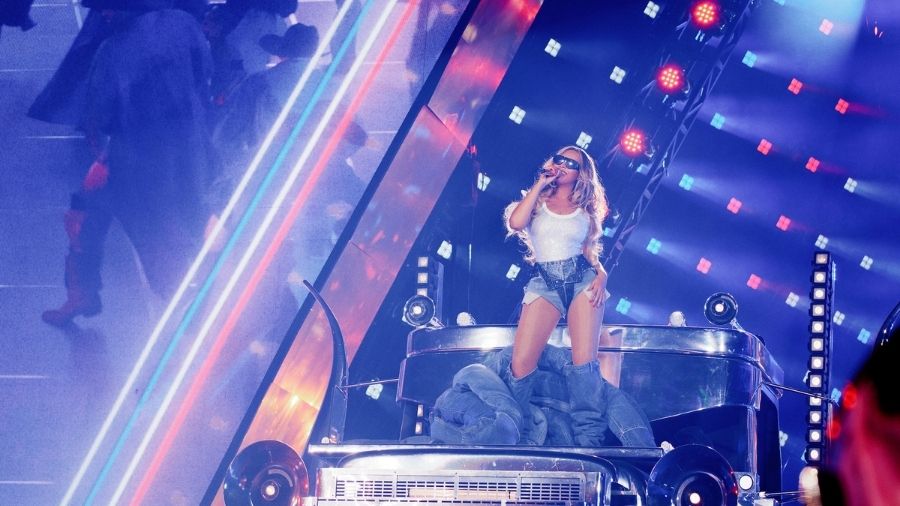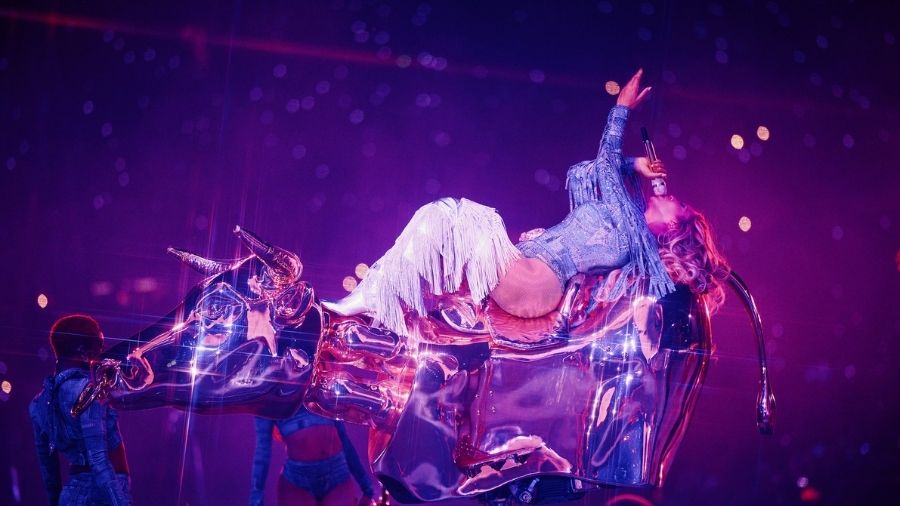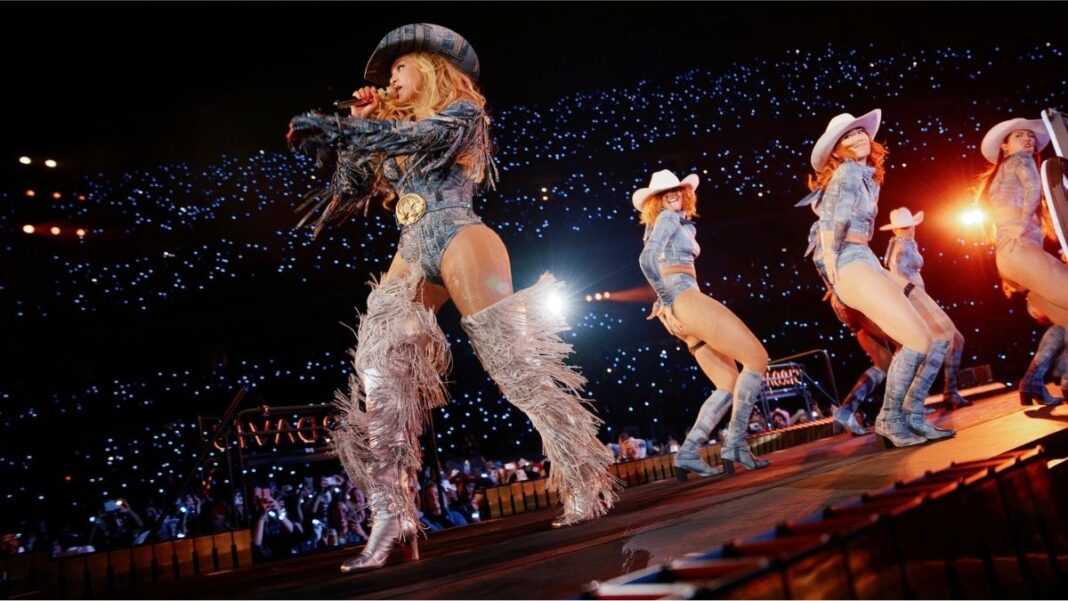On her Cowboy Carter Tour in Chicago, Beyoncé redefined country music through a Black lens—blending motherhood, history, and generational artistry in a genre-bending spectacle (Photo Credit: Parkwood Entertainment).
“It’s a lot of chatter here, but let me make myself clear. Can you hear me, or do you fear me?”
As Beyoncé took the stage for her highly anticipated tour stop, she chose those words from her song “American Requiem” to set the tone for her outstanding Saturday concert at Chicago’s Soldier Field. Dressed in golden rodeo attire and armed with a cowboy hat and sunglasses, Beyoncé was ready to perform for the “Beyhive” and address America unapologetically about Black culture and her critics.
A Reclamation of Country Music and Identity

Photo Credit: Parkwood Entertainment
At the heart of Cowboy Carter is Beyoncé’s response to long-standing criticisms questioning her right to create a country album. For many, the country music genre is synonymous with rural white America, and the idea of a Black woman from Houston, who has revolutionized pop and R&B, venturing into country music raised eyebrows within the music genre.
Although notably snubbed at the 2024 CMA Awards, Beyoncé won Best Country Album at the Grammys this year.
Some critics have long argued that Beyoncé should “stay in her lane,” but she firmly rejects this narrow view.
She addressed this head-on throughout the show, reminding her audience of country music’s roots. She outlined how Black people have always been at the heart of country music and Southern culture.
From Black cowboys and cowgirls to the foundational rhythms that shaped the genre, Beyoncé connects her family history to this music. She points out that her ancestors were part of this story long before the whitewashed narratives of modern country music emerged.
Her Family, Her Heritage, Her Right to Make Country Music
With a voice full of conviction, Beyoncé delivered a powerful message to those questioning her authenticity.
During one of the interludes, the words “If America is the land of the free, I don’t have to ask for permission to claim what’s mine” lit up the screen, also capturing the heart of the show’s message: America was built by Black people, and it’s time that truth is acknowledged.
Her critique extends beyond personal validation; it demands recognition of Black American culture and the foundational role Black musicians have played in shaping genres such as country, blues and gospel.
Thus, she has earned every right to take up space in any music genre she chooses.
Passing the Torch: A Family Affair
As the show progressed, Beyoncé’s daughters, Blue Ivy and Rumi Carter, joined her on stage, reinforcing her message of legacy. Rumi sat beside her mother during her stage debut, as Beyoncé sung, “Even though I know someday you’re gonna shine on your own, I will be your projector.”
In a sweet, sibling-coded moment, Blue’s hair falls in Rumi’s face, and Rumi quickly brushes it away, showing their natural bond and quiet connection on stage.
Blue Ivy, with the poise of a seasoned performer, danced alongside her mother, demonstrating that her family’s artistry is a fleeting moment and a generational tradition.
The crowd cheered as Blue Ivy took to the runway for a solo performance of “Déjà Vu. ” She threw her rodeo hat off and danced with the same fiery energy her mother exudes.
The Music: A Blend of Genres, A Celebration of Black Artistry

Photo Credit: Parkwood Entertainment
The Cowboy Carter Tour is a genre-bending journey through Beyoncé’s rich musical evolution. From her early days in Destiny’s Child, where she helped define the sound of late ’90s and early 2000s R&B and pop, to her solo career exploring soul, hip-hop, rock, house, Afrobeat and now country.
The tour brings all that history to the stage, blending it with country, blues, gospel and even opera.
On stage, Beyoncé honors the Black artists who paved the way, paying tribute to legends like Linda Martell, Chuck Berry, Little Richard, Tina Turner, Prince and Frankie Beverly & Maze mixing “Before I Let Go” with 803 Fresh’s “Boots on the Ground,” seamlessly blending tradition with a modern edge.
Honoring Her Uncle Johnny and the LGBTQ+ Community
One of the most touching moments of the concert came when Beyoncé revisited themes from her Renaissance tour, honoring her late Uncle Johnny, who passed away in 1998.
In a heartfelt tribute, she dedicated a part of the show to Uncle Johnny, expressing gratitude for his influence on her and acknowledging the LGBTQ+ community’s role in shaping her artistry and sense of self.
It was a moment of deep respect and love, underscoring Beyoncé’s ongoing commitment to supporting marginalized communities.
Crowd and Fashion: A Global Celebration
The fashion at Cowboy Carter was as diverse as the crowd itself. Fans arrived dressed in a mix of classic cowboy gear—boots, hats, and denim—paired with the latest global fashion trends. From streetwear to haute couture, attendees brought a unique flavor to the show, blending regional styles with international influences.
An employee at Alcala’s Western Wear, located at 1733 W. Chicago Ave. in Chicago, took to TikTok to thank Beyoncé after a surge in customers flooded the store ahead of her Cowboy Carter tour stop. “I just want to say thank God for Beyoncé; her fans are so loyal. It feels like everyone’s coming in to buy outfits for her concert. They want to be dressed to the nines. So I say thank you, and thank you, God.”
Finale: 16 Carriages and a Call to Creation
Beyoncé closed the show with powerful renditions of “16 Carriages” and “Amen,” donning a black jumpsuit accented with the American flag. This choice symbolized a rejection of old notions of white nationalism and boldly declared that America is the collective home of Black people.
As she sang, “I ain’t got time to waste, I got art to make,” from “16 Carriages,” the line served as a personal mantra and a cultural declaration. Beyoncé has always been more than a pop star—she is a cultural architect. She elevates her children, community, and ancestors through her art, constructing music and a movement.
The Cowboy Carter Tour is more than a concert. It reimagines country music through a Black cultural lens, spotlighting voices that have been too often erased while reflecting Beyoncé’s genre-spanning legacy.



